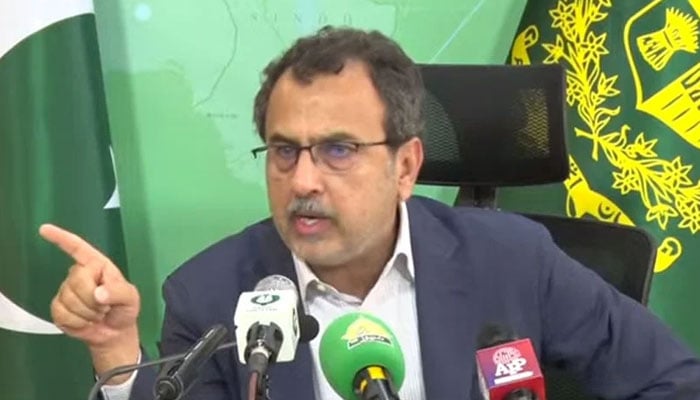Power plants’ conversion to Thar coal discussed with China: Leghari
He was speaking during an interview with Geo News programme Naya Pakistan, hosted by Shahzad Iqbal
ISLAMABAD: Federal Minister for Energy (Power Division) Awais Leghari said Sunday they held detailed discussions on “reprofiling” of power sector debt with China.
He was speaking during an interview with Geo News programme Naya Pakistan, hosted by Shahzad Iqbal.
His statement came after a high-level delegation of the federal government — including him and finance minister, concluded his visit to China five days ago, eyeing reprofiling of the Chinese power sector debt in Pakistan.
He said that a reduction of Rs2 to Rs2.5 per unit of electricity could be made after the conversion of coal power plants to local coal.
The minister detailed that they held talks with China’s National Energy Administration regarding Pakistan’s energy-related reforms, including the conversion of power plants to Thar coal and technological changes to execute the plans.
He added that the Chinese administration praised the reform ideas floated by the Pakistani government and agreed on making progress in executing the steps. When questioned about local electricity prices, Leghari said that variation of “power rates was an internal matter of Pakistan”. The minister further said that the consumers would benefit after the government reduced its capacity payments to the independent power producers (IPPs) via debt reprofiling.
To another question, he replied that the country had four coal power plants, including one owned by the government. “The government, along with K-Electric, is converting its coal power plant to local coal. Other three coal plants have a capacity to generate 1,200 MW of electricity each.”
With regards to the power generation expenses, Leghari said that the energy cost of imported coal was Rs24 per unit. “Due to depreciation of Pakistani currency’s value and interest rate, Rs2,100 billion was disbursed as capacity payment [to IPPs] instead of Rs800 billion.”
The cost would massively drop to Rs7.5 to Rs8 per unit if the power plants started using local coal, he added.
“Under the policy of 1994 and 2002, the government has completed the working of 20 plants. Customers would receive an annual benefit of Rs80 billion after unplugging 20 plants from the system,” said the minister.
He confirmed that Pakistan owed $8.5 billion to China in terms of power sector debts on commercial interest rates.
Exorbitant power prices became a major trouble for the government to handle amid massive power sector debt as the issue prompted a huge public uproar.
Moreover, protests from political parties across the country over the backbreaking taxes and electricity bills also mounted pressure on Prime Minister Shehbaz Sharif to reverse the decisions.
Poor and middle-class households have been affected by a previous IMF bailout reached last year, which included raising power tariffs as part of the funding programme that ended in April.
Annual power use in Pakistan is expected to fall consecutively for the first time in 16 years as higher tariffs curb household consumption, despite summer temperatures surging to near records, which typically boosts air conditioning and fan use.
-
 ‘Disgraced’ Andrew Still Has Power To Shake King Charles’ Reign: Expert
‘Disgraced’ Andrew Still Has Power To Shake King Charles’ Reign: Expert -
 Why Prince William Ground Breaking Saudi Tour Is Important
Why Prince William Ground Breaking Saudi Tour Is Important -
 AOC Blasts Jake Paul Over Bad Bunny Slight: 'He Makes You Look Small'
AOC Blasts Jake Paul Over Bad Bunny Slight: 'He Makes You Look Small' -
 At Least 53 Dead After Migrant Boat Capsizes Off Libya
At Least 53 Dead After Migrant Boat Capsizes Off Libya -
 'God Of War' Announces Casting Major Key Role In Prime Video Show
'God Of War' Announces Casting Major Key Role In Prime Video Show -
 Real Reason Prince William, Kate Broke Silence On Andrew Scandal Revealed
Real Reason Prince William, Kate Broke Silence On Andrew Scandal Revealed -
 Drew Barrymore Responds To 'Charlie's Angels' Costar's Comments About Her
Drew Barrymore Responds To 'Charlie's Angels' Costar's Comments About Her -
 Shakira Slips Hard On Stage During Life Show
Shakira Slips Hard On Stage During Life Show -
 King Charles Speaks Out Over Andrew's Scandal: 'Stand Ready To Help Police'
King Charles Speaks Out Over Andrew's Scandal: 'Stand Ready To Help Police' -
 Dax Shepard Recalls Horrifying Accident That Almost Killed Him
Dax Shepard Recalls Horrifying Accident That Almost Killed Him -
 Logan Paul's Bodyguard Hits Fan On Super Bowl Day
Logan Paul's Bodyguard Hits Fan On Super Bowl Day -
 Epstein Files: Anne Hathaway Mentioned As Highly Desired Guest For Bill Gates?
Epstein Files: Anne Hathaway Mentioned As Highly Desired Guest For Bill Gates? -
 Prince Harry Under A Lot Of Stress As Meghan Markle Makes Bizarre Demands
Prince Harry Under A Lot Of Stress As Meghan Markle Makes Bizarre Demands -
 Princess Beatrice, Eugenie's Subtle Break From Disgraced Parents Exposed
Princess Beatrice, Eugenie's Subtle Break From Disgraced Parents Exposed -
 Baby Left In Running Bathtub Dies After Father ‘forgets’ Him
Baby Left In Running Bathtub Dies After Father ‘forgets’ Him -
 King Charles Takes A Major Step To Keep Horrified Prince William Out Of The Loop On Andrew: Insider
King Charles Takes A Major Step To Keep Horrified Prince William Out Of The Loop On Andrew: Insider




